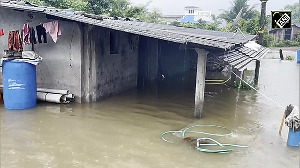The common and mobile pool of skilled labour in India, created by the reforms process, would be drawn to fast growing states and reduce the profitability of labour-intensive manufacturing, widening the incomes and other disparities between the states, says an International Monetary Fund study.
Pre-1980s policies in the country, championed on grounds of equity and socialism, might also be the cause of the divergence in incomes and other disparities between states in more recent years, said the study: India's Pattern of Development: What Happened, What Follows.
In post-liberalisation period, India's fast growing states like Kerala, Tamil Nadu, Andhra Pradesh, Karnataka and Gujarat appeared to have skipped directly to specialisation in skill-intensive industries within manufacturing or to services where they have appear to have a comparative advantage at least vis-a-vis other poor countries.
"The convergence phenomenon (between states) that typically takes place across countries may be impeded in India of the future by one big difference -- the common and mobile pool of skilled labour," said the study, authored by IMF chief economist Raghuram Rajan among other researchers.
The very fact of skill-based development in the fast growing states may impede labour-intensive development because of the rise in the price of skilled labour, the study said.
"This could induce an Indian variant of Dutch disease (Bangalore Bug so to speak) that would reduce the profitability of labour-intensive and tradeable manufacturing," it said.
The study has included Uttar Pradesh, Bihar, Rajasthan and Madhya Pradesh in the list of laggard states in India.
In an era of global supply chains with wafer-thin profit margins, decline in profitability of labour-intensive manufacturing might be a substantial impediment to the growth of these industries in the lagging states.
If this process continues, the fast-growing states will not only suck the more mobile skilled labour from the slow moving states leading to further hollowing out of prospects, but also the divergence in growth rates will increase further, the study said.
Based on current fertility rates in different states, of the expected 620 million addition to the Indian population between now and 2051, 60 per cent will be in Bihar, Madhya Pradesh, Rajasthan and Uttar Pradesh and only 22 per cent will be in the fast growing states.
With populous laggard states like Uttar Pradesh and Bihar having substantial political power because of their numbers, the demands for redistribution will increase as will migration.
These will create immense political strains between Indian states and the potential for serious differences, the study pointed out.
On the impact of pre-1980s policies on the present day India, the study said, "The move towards pro-business and pro-market economic policies, thanks to pre-existing patterns of specialisation in favour of skill-based production, have unleashed the gale winds of divergence, big time."
A unitary India, centralised politically and uniformly mediocre in economic performance, has given way to "multiple Indias" with performance more related to the capabilities of individual states and the opportunities they create, the study said.





